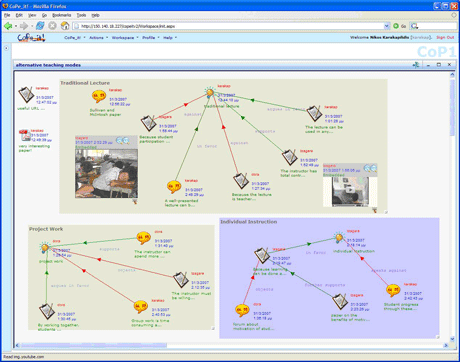by Nikos Karacapilidis, Dora Nousia and Manolis Tzagarakis
CoPe_it! is a tool of the Web 2.0 era. It complies with collaborative learning principles and practices, and provides members of communities engaged in argumentative discussions and decision-making processes with the appropriate means to collaborate towards the solution of diverse issues. It builds on an incremental formalization approach, which is achieved through the consideration of alternative projections of a collaborative workspace, as well as through mechanisms supporting switches from one projection to another.
Argumentative collaboration can augment learning in many ways, such as in explicating and sharing individual representations of the problem, maintaining focus on the overall process, maintaining consistency, increasing plausibility and accuracy, and enhancing the group's collective knowledge. Designing software systems that can adequately address the need of users to express, share and reason about knowledge during an argumentative collaboration session has been a major R&D activity for more than twenty years. Technology that supports argumentative collaboration usually provides the means for the structuring and visualization of discussions, the sharing of documents, and user administration. Generally speaking, the intention is to explore argumentation as a way of establishing common ground between diverse stakeholders, understanding positions, surface assumptions and criteria, and collectively constructing consensus.
When engaged in the use of such technology, users must follow a specific formalism; that is, their interaction is regulated by procedures that prescribe and constrain their work. This refers to both the system-supported actions a user may perform, and the system-supported types of argumentative collaboration objects. In many cases, users must fine-tune, align, amend or even completely change their usual way of collaborating in order to be able to exploit the system's features and functionalities. Such formalisms are necessary to allow the system to interpret and reason about human actions, and thereby offer advanced computational services. However, there is much evidence that sophisticated approaches and techniques often result in failure. This is often due to the extra time and effort that users must spend in order to become acquainted with the system, and the associated disruption of their usual workflow. Formal approaches also possess an 'error prone and difficult to correct when done wrong' character.

To address the above issues, CoPe_it! pays close attention to various visualization and reasoning issues raised in a collaborative learning context. Such a consideration is in line with the 'information triage' process, ie the process of sorting through numerous relevant materials and organizing them to meet the task at hand. CoPe_it! builds on a conceptual framework in which formality and the level of knowledge structuring during argumentative collaboration is not considered to be a predefined and rigid property, but an adaptable aspect that can be modified to meet the needs of the tasks at hand. By the term formality, we refer to the rules enforced by the system, with which all user actions must comply. Allowing formality to vary within the collaboration space, 'incremental formalization', ie a stepwise and controlled evolution from a mere collection of individual ideas and resources to the production of highly contextualized and interrelated knowledge artefacts, can be achieved. This evolution is associated with a set of functionalities related to the following:
- collection and sharing of knowledge items
- exploitation of legacy resources
- interrelation and evolution of knowledge items
- informal/semiformal argumentation
- informal/semiformal aggregation of knowledge items
- semantic annotation of knowledge items
- formal exploitation of knowledge items patterns
- formal argumentation and reasoning.
In our approach, 'projections' constitute the vehicle that permits incremental formalization of argumentative collaboration. A projection can be defined as a particular representation of the collaboration space, in which is available a consistent set of abstractions able to solve a particular organizational problem during argumentative collaboration. With the term abstraction, we refer to the particular knowledge items, relationships and actions that are supported through a particular projection, and with which a given problem can be represented, elaborated and - ultimately - solved. CoPe_it! enables switches to be made from one projection to another, during which the abstractions of a certain formality level are transformed to those of another formality level. This transformation is rule-based (rules can be defined by users and/or the facilitator of the collaboration and reflect the evolution of a community's collaboration needs). According to our approach, it is up to the community to exploit one or more projections of a collaboration space (according to the needs and expertise of users and/or the overall collaboration context).
Finally, CoPe_it! reduces the overheads associated with entering information by allowing the reuse of existing documents. Mechanisms for reusing existing knowledge sources, such as e-mail messages and entries or topics of Web-based forums, have been integrated.
This work is carried out within the framework of the IST FP6-2004-028038 PALETTE project, which is partly funded by the EU. The project started on 1st February, 2006 and has a duration of 36 months.
Link:
http://copeit.cti.gr/
Please contact:
Nikos Karacapilidis
Research Academic Computer Technology Institute, Greece
Tel: +30 2610 960480
E-mail: karacap![]() cti.gr
cti.gr










